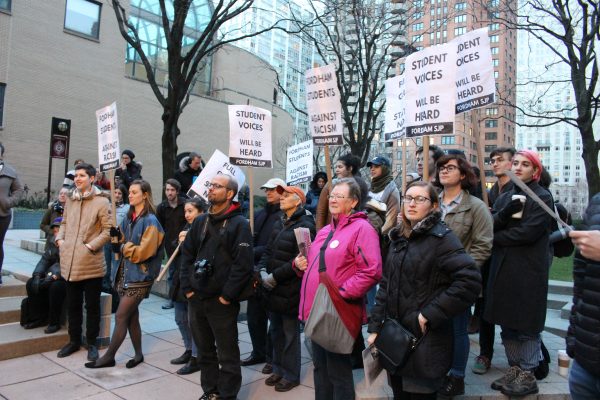Students Oppose Fordham’s Motion to Dismiss in SJP Legal Battle
Crowds gather outside of Fordham Lincoln Center Plaza to advocate for Students for Justice in Palestine. (GEORGE HORIHAN/The Observer)
September 2, 2017
The fight to grant club status to Students for Justice in Palestine (SJP) has not ended, as several Fordham students who are engaged in an ongoing legal battle with the university have filed their opposition in response to the university’s June motion to dismiss their lawsuit.
The filing, occurring on July 10, is the latest move in a two-year battle for Fordham University to recognize SJP as an official club. After a year-long application process that garnered the support of the United Student Government (USG), Dean of Students Keith Eldredge denied the group club status after consulting with school officials, faculty, and students. In his email explaining his decision, Eldredge stated that the “complex” topic of the Israeli-Palestinian conflict often leads to “polarization rather than dialogue,” and that “the purpose of the club as stated in the proposed club constitution points toward that polarization.”
Although the students provided a letter expressing their non-affiliation from the National Students for Justice in Palestine (SJP), Senior Vice President for Student Affairs Jeffrey L. Gray wrote on January 20 that the decision “was based on the fact that chapters of this organization have engaged in behavior on other college campuses that would violate this University’s student code of conduct.”
The students of SJP filed a lawsuit on April 26, represented by the Center for Constitutional Rights, Palestine Legal and cooperating counsel Alan Levine.
In the following months, the university brought disciplinary charges against plaintiff Sapphira Lurie, Fordham College at Lincoln Center (FCLC) 17, as a result of an unsanctioned January 23 protest in support of SJP. After leaving due to the fact that she was not allowed to have representation or a third individual attend her hearing, she was sanctioned. Additionally, over 100 Fordham faculty members signed a petition in support of granting SJP club status.
The students of SJP filed a lawsuit on April 26, represented by the Center for Constitutional Rights, Palestine Legal and cooperating counsel Alan Levine. In early June, the university made the decision to move to dismiss their lawsuit rather than establishing SJP as an official club at Fordham.
“Groups like the proposed SJP at Fordham play a vital role in helping to shift domestic public opinion away from uncritical support for Israeli policies,” Palestinian Legal stated in an official response to the university’s motion to dismiss. “Fordham’s ban on SJP reflects a broader trend of growing hostility towards advocacy for Palestinian rights.”
On May 3, a group of Fordham alumni wrote an open letter to President Joseph McShane, Dean Eldredge and other officials at the university, stating their opposition to the decision to ban the SJP chapter at Fordham.
“We believe that by denying organizational status to Students for Justice in Palestine after the group was approved by the Fordham United Student Government (USG), then by singling out one student protesting this decision for disciplinary action, you contribute to the systemic silencing and punishing of students who choose to exercise their free speech to organize in support for the struggle for justice in Palestine,” the letter stated.
In the letter’s conclusion, the alumni urge the university to reserve the “discriminatory denial of organizational status” to SJP.
The letter also expressed concern for Fordham’s reputation, mentioning that Fordham is included in the Foundation for Individual Rights in Education (FIRE) 2017 ranking of “The 10 Worst Colleges For Free Speech,” referencing a sentence that states that few universities are as “persistent and brazen” as Fordham University in imposing “viewpoint-discriminatory justifications for rejecting student groups’ applications to become officially recognized.”
In the letter’s conclusion, the alumni urge the university to reserve the “discriminatory denial of organizational status” to SJP.
“The university should encourage, not repress, students as they engage in critical thinking and organizing on issues that compel their interest and enliven informed debate on campus,” the letter states. “We therefore call upon you not to spend precious resources on a legal defense when you have the capacity and support to follow your own rules—and to support freedom of speech—without a Palestinian exception.”














Jerry J • Sep 5, 2017 at 6:53 pm
Bravo to Fordham for not tolerating the hate of SJP!!!